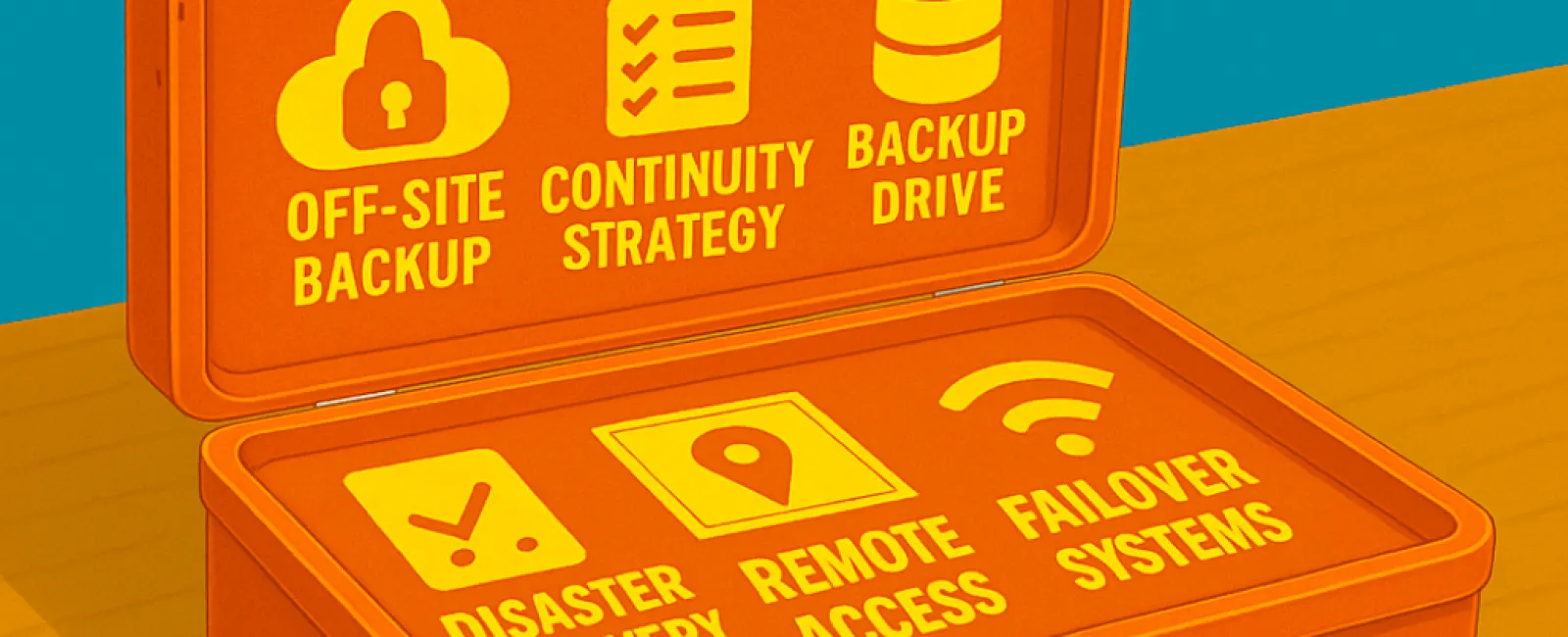July 28, 2025
Unexpected events like power outages, cyberattacks, hardware malfunctions, and natural disasters can strike without warning, causing severe damage to small businesses. Many believe that simply having backups will safeguard them, but restoring a file is just one piece of the puzzle. If your systems are inaccessible, remote work support is lacking, or communication with your team and clients breaks down, even brief interruptions can lead to significant long-term setbacks. A dependable IT partner goes beyond backups, crafting a comprehensive strategy to ensure your business stays operational no matter the challenge.
Backups Alone Aren't Enough — You Need a Robust Continuity Strategy
Don't get us wrong: backups are critical. However, true security comes from a well-thought-out business continuity plan that guarantees your operations run smoothly during and after disruptions.
When disaster causes system failures, data becomes inaccessible, or your office space is unusable, a backup stored locally offers limited help. Without a detailed, rapid recovery plan, you risk damaging your revenue, reputation, and regulatory compliance.
Understanding the Crucial Difference: Backup vs. Business Continuity
Many organizations make this common mistake:
● Backups retrieve lost data.
● Continuity keeps your business running no matter what.
An effective continuity plan clarifies vital points such as:
● Recovery speed — how quickly can operations resume?
● Alternative work locations if your primary office is unavailable.
● Identification of mission-critical systems.
● Designated personnel responsible for executing the recovery plan.
Key elements also include:
● Secure, encrypted off-site backups that cannot be altered.
● Prioritized recovery objectives (RTO and RPO).
● Preparedness for remote work environments.
● Redundant infrastructure and automatic failover systems.
● Routine disaster simulation exercises to ensure readiness.
If your current IT provider cannot address these critical factors confidently, it's not protection — it's luck holding you together.
Could This Happen To You? The Real Threats Are Here
This isn't just a hypothetical scenario designed to push you toward a continuity plan. These are ongoing incidents impacting real businesses:
● Florida hurricanes have displaced hundreds of businesses, leaving those without cloud access completely immobilized.
● North Carolina flooding wiped out on-site servers, erasing months of vital records and billing information.
● California wildfires destroyed entire office buildings, leaving many companies without an off-site recovery plan.
Countless small businesses hit by ransomware attacks have also discovered backup files were corrupted or never properly tested.
Disasters don't discriminate — they affect businesses like yours every day.
Critical Questions You Should Be Asking Right Now
If disaster strikes tomorrow, will your business survive and continue to serve clients?
Pose these essential questions to your IT provider:
● How quickly can we recover from a ransomware attack?
● Are our backups regularly tested and inclusive of all critical systems?
● What's the contingency plan if flood or fire renders our office inaccessible?
● Is our business continuity approach aligned with industry compliance standards?
● Can we maintain client services if employees must work remotely?
If you can't answer these questions with full confidence, your business is vulnerable right now.
Natural Disasters Are Unavoidable. Downtime Isn't.
You cannot stop power failures, severe weather, or cyber threats — but you can control how you respond to them.
An excellent IT partner assists with recovery.
An exceptional one ensures your business remains uninterrupted.
Wondering where your business stands today?
Click Here or call us at (802) 331-1900 to schedule a FREE Discovery Call, and safeguard your business from turning disasters into downtime.





